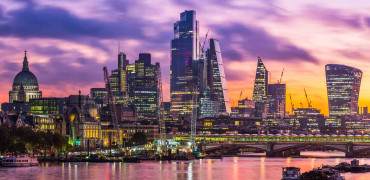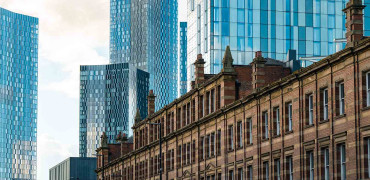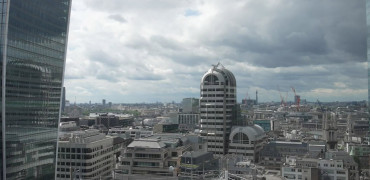I don’t know about you but I’m a huge fan of the Olympics and looking forward to them opening in Paris this week.
And this got me thinking about the climate crisis and how we can’t solve our problems unless we come together as a team, whether that is in your own household, your workplace, your town and region, or as nation’s working together across the globe.
I’ve heard it said that the race to prevent the worst of climate change is like a marathon, and it’s going to take time before we reach the finishing line, but I think this analogy is wrong.
I think this is more like a relay race, because not only does it require teamwork, but also whilst net zero may be a target, it’s not an end point. 2050 is the date (or finishing line) for when we must be doing things in the right way to care for our planet, but we will also be passing the baton on to future generations, who will need to continue living in a low-carbon way.
Calling for decisive action within the next two years, the report lists 8 key actions needed
A marathon read
I’ve just finished reading the ‘Future Energy Scenarios – Pathways at a Glance’ which is the latest report by the UK’s Electricity System Operator or ESO.
The foreword by Claire Dykta, the Director of Strategy & Policy says that we need “decisive action within the next two years to deliver the fundamental changes required to achieve a fair, affordable, sustainable and secure clean energy system by 2050.”
The report updates the previous framework used since 2020 and states that “we are in a period of significant change for the energy industry as a whole” so “the Future Energy Scenarios framework has adapted to support strategic network planning.”
I love a good report, but the full document was a bit of a marathon read even for me as it includes detailed charts on the decarbonisation milestones on the way to 2050.
It also includes the warning that whilst we may still be able to deliver emissions reductions in line with the Sixth Carbon Budget, we will need to get a bit of a sprint on and go further and faster.
That means that, unlike the Olympics, we can’t leave the 100 metres till the end and must step into the blocks right now.
Plotting the future
The graphs that fascinate me most and which I think should be compulsive reading for everyone though, are the ones showing the different energy supply and demand scenarios based on four different energy pathways: Holistic Transition; Electric Engagement; Hydrogen Evolution; and Counterfactual (previously known as Business As Usual or BUA).
In the report, Holistic Transition is described as” Net zero met through a mix of electrification and hydrogen, with hydrogen mainly around industrial clusters. Consumer engagement in the transition is very strong with demand shifting, with smart homes and electric vehicles providing flexibility to the grid.”
Electric Engagement is: “Net zero met through mainly electrified demand. Consumers are highly engaged in the energy transition through smart technologies that reduce energy demands, utilising technologies such as electric heat pumps and electric vehicles.
Hydrogen Evolution is described as: “Net zero met through fast progress for hydrogen in industry and heat. Many consumers will have hydrogen boilers, though energy efficiency will be key to reducing cost. There are low levels of consumer engagement. Hydrogen will be prevalent for heavy goods vehicles, but electric car uptake is strong.
Whereas Counterfactual is: “Net zero missed, though some progress is made for decarbonisation compared to today. While home insulation improves, there is still a heavy reliance on gas across all sectors, particularly power and space heating. Electric vehicle uptake is slower than the net zero pathways, but still displaces petrol and diesel.
An 8-point action plan
With the call for decisive action within the next two years, the report list 8 key actions that society needs to embrace:
- Accelerate the delivery of whole system infrastructure through a strategic approach to network investment and introduction of planning reforms.
- Deliver market reform, considering electricity, gas, hydrogen and CO2, to ensure we have energy markets that provide for and work with a reliable and strategically planned energy system.
- Prioritise the use of hydrogen for hard-to-electrify applications. Agree business models and kick-start delivery of the hydrogen and CO2 transport and storage infrastructure needed for system flexibility.
- Accelerate progress on low carbon heating including faster rollout of heat pumps irrespective of a decision on hydrogen for heat.
- Deliver innovation and build consumer trust in affordable smart technology, enabling consumers to save on energy costs while helping with the management of Great Britain’s electricity system.
- Focus on energy efficiency improvements across all sectors to reduce overall energy demand.
- Expedite the delivery of clean, low-cost and reliable new technologies and long-duration energy storage connected to the system by reforming the connections process.
- Invest in supply chain and skills to deliver the low carbon technologies and infrastructure needed for net zero and enable the UK to become a world leader.
The only race that matters
Decarbonisation of the energy system is the most important challenge of our generation.
That is why the Future Energy Scenarios have been created to act as the foundation upon which future network investment plans will be built.
What we need now is to embrace the spirit of collaboration and success that the Olympics embodies and work across industry, Government, stakeholders and consumers so that we can end up with a society and economy that helps sustain both us and our planet.
We need to remember that what was described as a marathon has now become a relay race.
We also need to remember that if we are not careful, it is in danger of becoming a sprint, or even perhaps, a 110m hurdles!
Chris Newman is Zero Carbon Design Manager- Mitsubishi Electric




